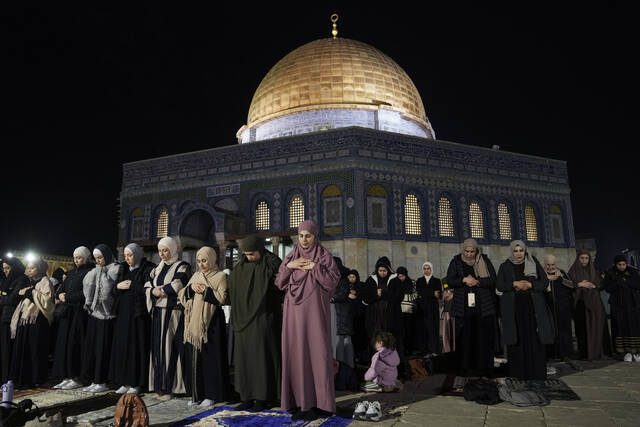CAIRO — Talks that were stuck in an effort to secure a cease-fire in the Israel-Hamas conflict are likely to resume seriously in Qatar starting on Sunday, as per Egyptian officials.
The discussions would be the first time both Israeli officials and Hamas leaders are involved in the indirect negotiations since the beginning of the Muslim holy month of Ramadan. International mediators had hoped to secure a six-week truce before Ramadan began earlier this week, but Hamas refused any deal that wouldn’t lead to a lasting cease-fire in Gaza, a demand Israel rejected.
However, both sides have taken steps in recent days to get the talks, which were not completely halted, back on course.
Hamas presented mediators with a new proposal for a three-step plan to end the fighting, according to two Egyptian officials, one directly involved in the talks and a second who was briefed on them. The officials spoke anonymously because they were not authorized to disclose the contents of the sensitive discussions.
The initial step would be a six-week cease-fire that would involve the release of 35 hostages — women, the sick, and elderly people — held by militants in Gaza in exchange for 350 Palestinian prisoners held by Israel.
Hamas would also release at least five female soldiers in exchange for 50 prisoners, including some serving long sentences on terror charges, for each soldier. Israeli forces would withdraw from two main roads in Gaza, allow displaced Palestinians to return to northern Gaza, which has been ravaged by the fighting, and enable the free flow of aid to the area, according to the officials.
The U.N. children’s agency reported on Friday that almost one in three children under 2 years old in the isolated north suffer from severe malnutrition.
In the second phase, both sides would declare a permanent cease-fire and Hamas would free the remaining Israeli soldiers held hostage in exchange for more prisoners, the officials stated.
In the third phase, Hamas would release the bodies it’s holding in exchange for Israel lifting the blockade of Gaza and permitting reconstruction to begin, the officials mentioned.
The discussions were expected to resume on Sunday afternoon, although they might be postponed to Monday, according to the Egyptian officials.
Israeli Prime Minister Benjamin Netanyahu called the proposal “unrealistic” but agreed to send Israeli negotiators to Qatar. His government has rejected calls for a permanent cease-fire, insisting it must first fulfill its stated goal of “annihilating Hamas.”
Thousands of people protested on Saturday night in Tel Aviv to express their impatience with Netanyahu’s government and demand a deal to free hostages. Some expressed support for U.S. Senate Majority Leader Chuck Schumer’s sharp criticism of Netanyahu’s handling of the war and his call for a new election.
“I think that we are in a situation where they are completely right, that we have a war that is continuing well beyond what is necessary,” protester Yehuda Halper said.
Netanyahu’s office announced on Friday that he approved military plans to attack Rafah, the southernmost town in Gaza where about 1.4 million displaced Palestinians — more than half the enclave’s population — are taking shelter. Israel aims to target Hamas battalions stationed there.
Many people ran to Rafah when Israel attacked Gaza after the Oct. 7 Hamas attack on southern Israel that killed 1,200 people and took another 250 hostage.
The United States and other countries have cautioned that a military operation in Rafah could be catastrophic.
Netanyahu’s office didn’t provide specifics or a schedule for the Rafah operation, but stated that it would involve moving the civilian population. The military has stated it planned to guide civilians to “humanitarian islands” in central Gaza.
“Many people are too weak, hungry and ill to be relocated again,” World Health Organization Director-General Tedros Adhanom Ghebreyesus said on social media, adding that there are no fully functional, safe health centers they can reach elsewhere in Gaza. “In the name of humanity, we appeal to Israel not to proceed.”
The Gaza Health Ministry reported that at least 31,553 Palestinians have been killed in the war. The ministry doesn’t distinguish between civilians and combatants in its count, but says women and children make up two-thirds of the dead.
An Israeli attack early Saturday destroyed a house in the urban Nuseirat refugee camp in central Gaza, killing at least 19 people, including nine children, as documented at the al-Aqsa Martyrs hospital. An Associated Press journalist there saw the bodies.
Israel’s aggressive actions have forced most of Gaza’s 2.3 million people from their homes. A quarter of Gaza’s population is starving, according to the U.N.
As part of efforts to provide desperately needed assistance, a ship established a sea route from Cyprus on Friday and unloaded 200 tons of humanitarian supplies sent by the aid group World Central Kitchen intended for people in northern Gaza.
The group stated it was preparing another vessel in Cyprus with hundreds of tons of aid.
Also on Saturday, Germany joined a group of countries, including the U.S. and Jordan, in undertaking airdrops of aid over Gaza. The U.S. also has announced separate plans to build a pier to bring in aid.
Displaced Palestinians living in tents along the Mediterranean coast remained hungry and hopeless.
“The situation is so bad that no one can imagine it, and the ship, even if it helps, will be a drop in the ocean,” said Zahr Saqr in Muwasi. “We run like dogs behind air drops.”



